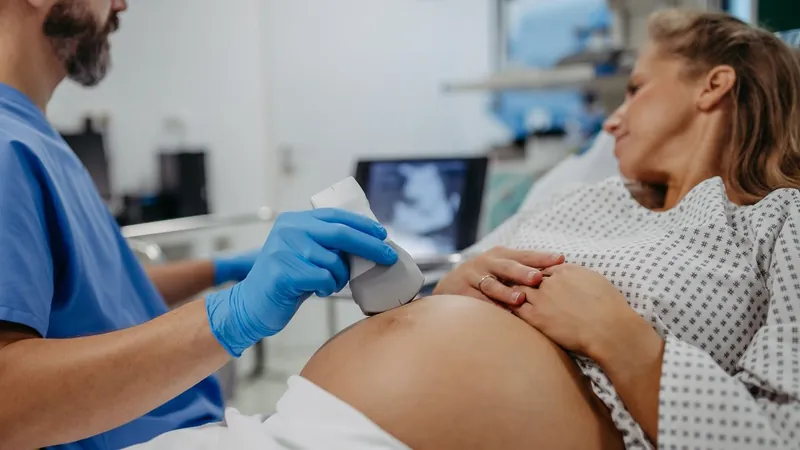
Shocking Link Between IVF and Health Risks in Babies: What Researchers Discovered in the Placenta!
2025-01-14
Author: Wai
In a groundbreaking study, researchers have uncovered that assisted reproductive technologies (ART), particularly in vitro fertilization (IVF), may influence the epigenetics of the placenta, potentially heightening the risk of certain health issues in newborns.
With over 10 million successful births attributed to ART worldwide, these medical advancements have significantly expanded family-building options for many. However, compared to unassisted births, ART can pose specific risks, including reduced birth weight and increased susceptibility to cardiovascular and metabolic disorders in children.
Emerging research indicates that ART-conceived children may exhibit changes in their epigenetics—those essential chemical tags on DNA that regulate gene function. A pioneering study published on Dec. 19, 2024, in Communications Medicine delves deeper into understanding these changes and what they may entail for child development.
Groundbreaking Study: Insights Into the Role of the Placenta
The research team analyzed placental tissues from multiple ART procedures to identify any genetic anomalies. They found that specific ART techniques can lead to varying degrees of gene expression changes, contributing to potential health outcomes in babies.
Siri Haberg, a public health researcher at the Norwegian Institute of Public Health, emphasized the importance of understanding these influences: “As the use of ART is increasing globally, identifying the safest procedures is essential for enhancing care for couples seeking fertility treatments.”
The Importance of the Placenta in Early Development
While most studies have predominantly used umbilical cord blood samples, lead author Nina Kaminen-Ahola from the University of Helsinki sought a more comprehensive perspective by examining placental samples. Despite the challenges of collecting these samples—taking nearly a decade—the team's efforts yielded significant insights.
The researchers collected samples from 80 pregnancies that involved ART and 77 that conceived without assistance. They focused on two ART methods: IVF and intracytoplasmic sperm injection (ICSI), emphasizing how embryo freshness influences genetic expression.
Key Findings: How Embryo Freshness Matters
The results revealed that fresh embryos—those implanted immediately post-retrieval—exhibited more pronounced alterations in gene expression than frozen embryos. This is attributed to the critical hormonal exposure fresh embryos undergo during early development. These differences were linked to variations in placental size and newborn growth, shedding light on why certain health issues may arise.
Additionally, placentas from ICSI-conceived embryos revealed extensive gene alterations tied to male fertility issues, providing further validation due to ICSI's use in couples facing male factor infertility.
The study pinpointed three specific genes—TRIM28, NOTCH3, and DLK1—with differing expressions in fresh-embryo placentas compared to both frozen-embryo and unassisted pregnancies. Notably, these genes are crucial to processes such as embryo implantation and vascular development in the placenta.
What This Means for Future Research
Despite these findings, Kaminen-Ahola reassured that the differences in gene activity observed are subtle and largely do not pose significant risks to maternal or fetal health overall. While ART babies may have slight increases in risks for conditions like heart defects and preterm birth, these incidents are considered "very small."
Nevertheless, this research opens new avenues for understanding how ART procedures and subfertility can impact placental function and, consequently, fetal development. Haberg noted that this study paves the way for further exploration of complications related to the placenta, such as preeclampsia and hypertension.
As researchers continue to build on these findings, they aim to gather more data on placental samples and discern the implications of the identified genes on fertility and fetal growth, enhancing the safety and effectiveness of ART for future families.
Stay tuned as we continue to unravel the complexities of IVF and its impact on child health!

 Brasil (PT)
Brasil (PT)
 Canada (EN)
Canada (EN)
 Chile (ES)
Chile (ES)
 Česko (CS)
Česko (CS)
 대한민국 (KO)
대한민국 (KO)
 España (ES)
España (ES)
 France (FR)
France (FR)
 Hong Kong (EN)
Hong Kong (EN)
 Italia (IT)
Italia (IT)
 日本 (JA)
日本 (JA)
 Magyarország (HU)
Magyarország (HU)
 Norge (NO)
Norge (NO)
 Polska (PL)
Polska (PL)
 Schweiz (DE)
Schweiz (DE)
 Singapore (EN)
Singapore (EN)
 Sverige (SV)
Sverige (SV)
 Suomi (FI)
Suomi (FI)
 Türkiye (TR)
Türkiye (TR)
 الإمارات العربية المتحدة (AR)
الإمارات العربية المتحدة (AR)